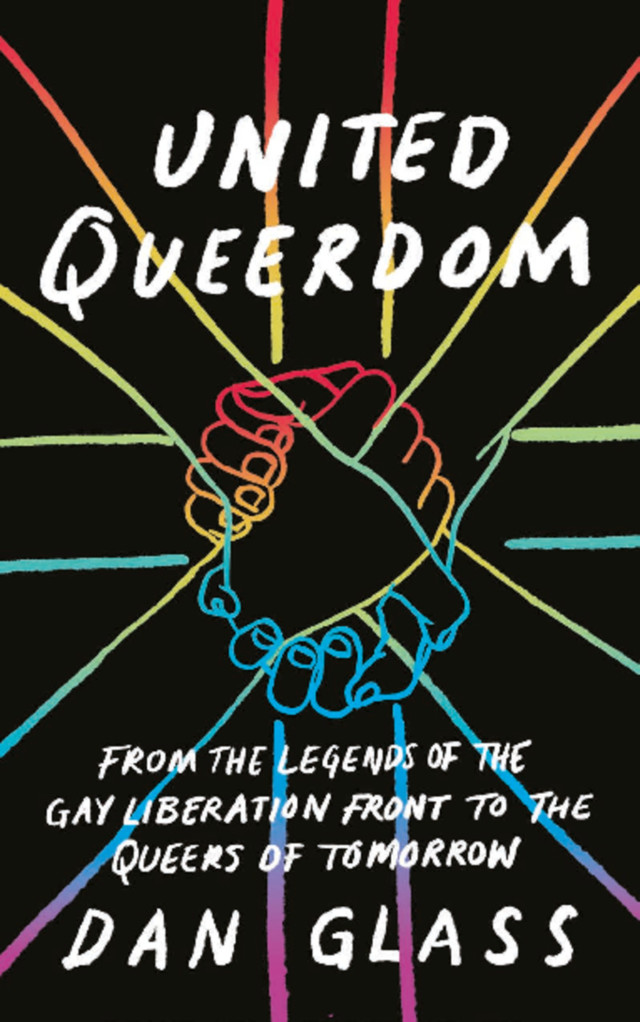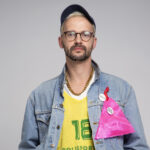Dan Glass
United Queerdom: From the Legends of the Gay Liberation Front to the Queers of Tomorrow is a toolkit of case studies, strategies, philosophies, methodologies and tactics for LGBTQIA+ liberation. But it doesn’t stop there. In the spirit of the original aims of the Gay Liberation Front (GLF), who started the modern Pride movement, it exists in the spirit of `Absolute Freedom for All’ and lives by the mantra of ‘All Injustices Are Connected.’

NOTCHES: What drew you to this topic, and what questions do you still have?
Dan Glass: I was drawn to honouring the etymology of the word ‘radical’, which means ‘root’: to dig deeper and to get to the root of everything rather just than the symptoms. I was sick of the shallow, commercial, hypocritical and violent practices of the modern Pride in London, even though I appreciate that it is a gateway for many people into their own transformation, as it has been for myself. I wanted to meet the people who started Pride, honour them and help continue their journey because there is still so much work to do.
NOTCHES: This book engages with histories of sex and sexuality, but what other themes does it speak to?
Glass: Love, power, fear, war, apartheid, peace, justice, freedom-fighting, education, emotions, Section 28, remembrance, amnesia, happiness, loneliness, AIDS, healthcare, abandonment, addiction, raves, ghosts, sex, friendship, creativity, local community building, global sex positive de-criminalisation, taking our purpose seriously as queers but not so seriously that we can’t laugh at ourselves.
NOTCHES: How did you research the book?
Glass: It was a balance between 65 interviews with some of the legendary founders of Pride and the early members of the Gay Liberation Front along with multiple pioneers in social justice movements, who continue their journey for justice for all, and my own experience. The autobiographical elements came through speaking with my twin sister and finally allowing myself to remember what I went through as a child living under Section 28, the ruthless and barbaric legislation that wiped our identities as queers out of existence. I wanted to include all the unfurling and unleashing that happened since then on the streets and raves and bedrooms across London, and also uncover icons throughout history and across the world who paved the way for the Gay Liberation Front.
NOTCHES: Whose stories or what topics were left out of your book and why? What would you include had you been able to?
Glass: Ooooh controversial one. I left out a lot of movement tactics that relate to ‘identity politics.’ Not the kind of identity politics that results in positive affirmation of marginalised communities, but the kind of identity politics that result in a reductive ‘oppression olympics’, a race-to-the-bottom understanding of change-making whereby everyone ends up at a dead-end road.
As a grandchild of four Nazi Holocaust survivors I’ve spent my life trying to understand how we can overcome victimhood to generate deep empathy with everyone and the courage to continually fight the system rather than each other. I learn from many including Willem Arondeus, a queer Dutch anti-fascist. In 1943 he blew up a records office that the Nazis were about to pilfer and saved thousands of lives. Just before he was executed his last words were: ‘Let it be known that homosexuals are not cowards.’
NOTCHES: How did you become interested in the history of sexuality?
Glass: Born of a long line of Jews, spanning Holland, Poland, Romania and Germany, my grandparents were hunted during the Nazi Holocaust. Sitting around the dinner table surrounded by shelves of enormous books, with page after page of autobiographies connected by train tracks to Auschwitz, gas chambers, concentration camp inmates with ‘Juden’ signs, identity codes for the persecuted including yellow stars for Jews and pink triangles for homosexuals – my heart ached. ‘Never. Again. Ever.’ I heard every Holocaust Memorial Day and I became curious as to why some people seek to transform their traumatic experience, and others to perpetuate it.
War survivors often open up to their grandchildren first; only when they are old do they feel they can be released. This is the bitter sweet my grandmother left me. I remember sitting with Michalina, my Polish grandmother, after school one day slurping chicken soup, spellbound whilst she began to pour her heart out. She sat there teary-eyed describing the day she said goodbye to her family not knowing if they would ever see each other again. She told me her Holocaust survival stories and what happened to the Jews of Kracow, Poland.
Knowing that I was both Jewish and gay entering adulthood, I couldn’t help but wonder: where was the other half of me? It took me months to finally pluck up the courage to ask her, ‘What happened to the homosexuals? Did they fight back?’
Startled: ‘Sssh Daniel! Just eat your chicken soup. It’s getting cold’, she simmered at me.
NOTCHES: How do you see your book being most effectively used?
Glass: United Queerdom is primarily a practical resource designed to strengthen the confidence, competence and commitment of LGBTQIA+ people as they engage with one another across cultures. It is of particular interest to anyone who works in community development, creative practice, community education, adult education, development education and social development. It is for anyone who wants to explore how to navigate and interrogate a matrix of injustices and pierce through the web of inequality that faces us every time we walk out the door. United Queerdom is most effectively used through interactive participation and action-learning whereby readers are connected with movements outside on the ground.
Specifically, I hope people will draw from the modes of expression that queer people have utilised to confront, respond and transform their situations living with rising LGBTQIA+ hate crime. The book records and disseminates artistic and activist processes to confront a variety of forms of institutionalised homophobia through workshops, performances, events, exhibitions, street interventions and community organising. It helps to build confidence, knowledge and skills to work with and challenge local and national governments to ensure social policies advantage the ongoing development of the LGBTQIA+ community.
NOTCHES: Why does this history matter today?
Glass: Because every g*d damn day over the last two weeks here in London a friend has been homophobically attacked or ‘batty bashed’ and screamed ‘faggot’ at whilst getting their heads kicked in. Not to mention the growing outcry at attacks from across the UK.
No, it’s not the 1920s when we had to hide in underground bars. It’s not the 1950s waiting for the The Wolfenden Report to be released to tell the world that, shock horror, we homosexuals ‘cannot legitimately be regarded as a disease’. It’s 2021 for crying out loud! In the last five years alone LGBTQIA+ hate crime has doubled and all minorities are living in fear as BREXIT ushers in a fear-mongering culture of ‘the other’. Something has to be done.
So learning from history, or rather ‘herstory’, helps immensely. Change can happen and nothing is absolute.
But how can I be so sure?
Because for fifty years the Gay Liberation Front have taught humankind this lesson in the most dazzling and spectacular fashion. Emerging from the Stonewall Uprisings in New York in 1969 it wasn’t long before they catalysed a movement here in Britain that lead to Pride today, but not as we know it. At the pumping heart of the GLF mission is the aim of ‘Absolute freedom for all’, a principled opposition against all oppression and to stand in solidarity with everyone everywhere facing discrimination and abuse.
Fast forward: in 2004 ‘Pride in London’ was officially changed from a protest to a parade, instantly de-politicising its purpose, as if there is nothing left to fight for. This is intentional. It is not helpful for people to question power. It is not helpful for ordinary people to be conscious.
It is helpful, however, to question everything if you think that an injustice to one is an injustice to all. As the late great popular educator Paulo Freire said, we must ‘read our own reality and write our own history’ to transform the world around us.
NOTCHES: Your book is published, what next?
Glass: I’m squirreling away on writing a new book: Queer Footprints: A Guide to Uncovering London’s Fierce History. Queer Footprints is a continuation of United Queerdom. Every step has taken me closer to deepening an understanding of what integration, connection and justice really looks like for our brilliant community. Readers will be taken through the city streets to uncover the scandalous, hilarious and empowering events of London’s queerstory. Follow in the footprints of veteran activists, such as those who marched in London’s first Pride parade in 1972 or witnessed the 1999 bombing of the Admiral Duncan pub in Soho. From the Brixton Fairies to the Pits and Perverts concert, Rebel Dykes to drag queen communes, Queer Footprints celebrates the hidden histories of struggle and joy. The shadows of gentrification, policing, homophobia and racism are time and again resisted. Queer Footprints is an act of revenge. It is a howl for retribution from the author’s soul against the institutionalised homophobia legislated in Section 28 that deprived a whole generation from the ability to be themselves. Queer Footprints is also a celebration on the 50th anniversary of the first Pride protests in Britain.
I am also part of a very exciting legal initiative to build a case to take the government to court for the crime that was Section 28, for the harm done to every queer in Britain. It may not be successful but it’s damn well worth a try.
In the meantime come and join us on August 27th for Queer Night Pride 2 to confront rising hate crime. Facebook event page here.
 Dan Glass is an award-winning activist, mentor, performer and writer. He uses music, performance and protest to catalyse love, soul, revolution and justice in communities confronting injustice. Dan is an educator from Training for Transformation (TfT). Dan has been named one of Attitude Magazine’s campaigning role models for LGBT youth, GaydarRadio Heroes Awards for Gay Rights activism and a Guardian ‘UK youth climate leader’ for famously supergluing the Prime Minister. Dan was recently awarded the ‘activist of the year’ at the ‘Sexual Freedom Awards 2017’ for contributions to sex-positive, queer, healthcare and human rights movements for social justice.
Dan Glass is an award-winning activist, mentor, performer and writer. He uses music, performance and protest to catalyse love, soul, revolution and justice in communities confronting injustice. Dan is an educator from Training for Transformation (TfT). Dan has been named one of Attitude Magazine’s campaigning role models for LGBT youth, GaydarRadio Heroes Awards for Gay Rights activism and a Guardian ‘UK youth climate leader’ for famously supergluing the Prime Minister. Dan was recently awarded the ‘activist of the year’ at the ‘Sexual Freedom Awards 2017’ for contributions to sex-positive, queer, healthcare and human rights movements for social justice.

NOTCHES: (re)marks on the history of sexuality is licensed under a Creative Commons Attribution-NonCommercial-NoDerivatives 4.0 International License.
Based on a work at www.notchesblog.com.
For permission to publish any NOTCHES post in whole or in part please contact the editors at NotchesBlog@gmail.com




